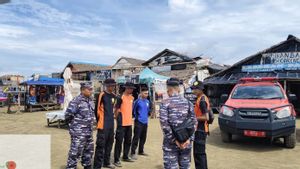JAKARTA - In journalism, investigative reports are the highest caste in the preparation of journalistic works. A 'tinned' reporter could not possibly present an investigative report. To compile this kind of journalistic work, it takes extraordinary writing skills, courage to blusukan the field with all the threats and challenges, carefulness, diligence, patience, partner networks to penetrate the main sources, and many other advantages.
So when a news link was sent entitled '' Papua: Investigation, it was revealed that a South Korean company 'deliberately' burned land for oil palm expansion ', immediately became interested in reading. Completed.
The narrative arrangement of this report is extraordinary, combined with sharp and humanist photos with high news value standards, making this article for the general public so strongly presented as information that cannot be refuted. Guaranteed to stir feelings.
Hence, it is not surprising that the BBC News Indonesia news link, which is the first media to present this news, can roll wildly into the realm of social media. Viral.
However, for those who have had contact with the world of journalism, it would be easy to understand that this report is full of information camouflage. The perspective is presented according to the point of view of the media, aka framing is strongly suspected.
Framing doesn't lie. However, there is a clever distortion of the facts, and is potentially misleading. Framing analysis is usually carried out through selecting information, highlighting certain aspects, selecting special images, to eliminating or removing information that should be conveyed.
Literally framing means the framing of the word frame which means frame. Framing is part of a media communication strategy and / or journalistic communication. News framing is an extension of the agenda setting theory, namely the selection of facts in an event that is considered important to be presented and thought about by the reader (public).
Robert N. Entman is one of the experts who laid the foundation of framing analysis for media content studies. Compilation of information to the public is usually structured in such a way that events are understood not to be taken of grated, on the other hand journalists and media are the ones who actively shape reality.
The main purpose of framing is to produce certain images, impressions, meanings desired by the media, or discourse that will be captured by the audience. Only people who have been clothed with the world of journalism can feel that news is compiled by framing analysis or not. Usually in cases like this, journalistic ethics, journalist competence, and media professionalism are actually at stake.
Indonesian Press figure, Rosihan Anwar, in a national press meeting on August 28, 2008 said, "Whatever the era, journalists are required to be competent. Namely, have a scientific, professional and ethical perspective. If not, then die journalism. ''
Information CamouflageRegrettably, the report in the 'highest caste of journalism' that was rolled out about the land fires in Papua, did not specify when the land fires occurred, and when the permits that caused forest destruction in the area were issued. Such important information is not even included until paragraph 15 of the first article!
The camouflage of information in this news seems to take advantage of Indonesian society's 'laziness to read'. Readers tend to draw conclusions from the title or just the writing in the opening lead. There is no interest in analyzing, let alone doing literacy studies. Based on the results of research from the Research and Development Agency of the Ministry of Education and Culture in 2019, the level of literacy in Indonesian society is low in 34 provinces.
The only sentence that describes the timing of the investigative news is written, "... which was released on Thursday (12/11) ...".
For those who are observant, these indicative sentences refer to the time the journalistic work was published, not when the incident in the information content occurred. Meanwhile, for those who are not observant, there is a huge potential to swallow this information whole as the time for a fire to occur. It is as if the incident was really new or was happening. Clever, right?
In the initial leads, written the words `` The investigation by Forensic Architecture and Greenpeace Indonesia, published on Thursday (12/11) together with the BBC, found evidence that Korindo had burned forests to open its oil palm plantations. '' However, it was not stated, when was the burning time? What year and when did the foreign company set foot in all its activities there? There is no!
This is where the camouflage of information in the form of framing is thought to be structured in such a way. Because there is not a single sentence in the first part of the article, it states that the entire investigation referred to is in fact an incident in 2013, as well as the result of the issuance of permits from 2009. It is not in the current presidential government that has just started its term of leadership at the end of 2014.
Camouflage by framing analysis is also found in the next chapter. The information presentation only highlights the imbalance between the 'giants and the suffering of the common people', human rights violations, poverty and injustice. As well as negating or removing information about the government's efforts to issue a permit moratorium policy since the change of government.
In addition, it negates the information that forest and land fires in that location have decreased drastically even up to 90% after the 2015 incident. It is noteworthy that Indonesia has experienced forest and land fires due to the impact of past policies. Even during the transitional period of government, forest permits were still released, which was part of the cause of the big karhutla in 2015.
It was only after corrective steps were taken, both in policy and in field work, that since 2016 the forest and land fires could slowly be overcome. Although not immediately drastic, but slowly but surely Indonesia finds the right scheme to handle forest and land fires by changing the work pattern from blackout to prevention.
Proven in 2020, Indonesia is free of smoke disasters amidst the pressure of the corona pandemic sweeping the world. Not all countries that still have forests can pass this 'deadly phase of the meeting of two disasters'. Unfortunately this information is lost.
It is just like the concept of Robert N. Entman framing, where the media do what is called make moral judgments or make moral decisions. Where moral values are used to legitimize or delegitimize. In this context, the existence or role of the state is being delegitimized, especially in Papua.
The framing narrative is structured in such a way, disguises the actual timing of information regarding fires, disguises the facts of ongoing environmental and forestry improvements, and removes information needed as a balance and becomes a fundamental right of the reader. Gorgeous, cunning (or sneaky?) Framing.
Confusing factsThe investigative report is jointly prepared with the NGO Greenpeace (GP) Indonesia. However, the basic material for compiling the information turned out to be the 2013 incident. May, to be precise.
Meanwhile, in the same year, from the existing digital footprint, the President and Minister of Forestry at that time had taken the time to visit Greenpeace's proud ship, the Rainbow Warrior, which was anchored at Tanjung Priok, Jakarta. June, to be precise.
This means that the GP actually had the discretion to convey its findings regarding land fires in Papua to the highest government leaders at that time. But why was it only done by the GP in November 2020, at a time when there was no fire as described?
GP admitted that the video was taken in May 2013, meaning that there are still 16 months before the change of government took place in October 2014. Why did GP waste 16 months by not reporting the Korindo case to the government? Why did you bring up the incident only after more than 7 years had passed?
Are GP classmates not following the massive changes in forest and environmental governance in Indonesia, or do they not want to admit it?
It should be noted that the decree on the release of forest area for plantations that was given by the Minister of Forestry to PT Dongin Prabhawa, is a 2009 decree. The fire that occurred in the video that went viral, also apparently occurred in 2013.
The fact that Papuan forests have been 'plotted' by Korean companies due to the issuance of state permits is one fact, but conveying camouflage of information by disguising and as if leading to opinions as if 'violations' are still happening today, is clearly something else that is different.
Law Enforcement SanctionsThe information provided by the BBC, is actually fine. Being part of the right to freedom of the press reveals the fact that there are still social disparities between local communities and companies that are entrenched in their ancestral lands. Information like this is very necessary, refusing to forget, for the sake of realizing justice for all Indonesian people.
However, it is unfair because the information puts forward all the 'crimes' of the environment and forestry are and are still happening today. This is where the 'fatal error' occurs.
Many hearts have been torn apart. Angry. Or even hate the government of the Republic of Indonesia. Because in essence a sense of injustice, oppression, poverty, have become enemies with the people of the world.
Not to mention the framing towards human rights violations, which has become a sensitive issue in Papua. Moreover, this article that is thought to be full of framing was published close to the celebration of Free Papua Day, early December. Framing is very dangerous.
Have you ever imagined what kind of potential risk the world will look to Indonesia from this indication of media framing? or what are the hearts of the Papuan people who misread the information? or even the Indonesian people as a whole respond to this news?
So it is precisely what the Professor of the Faculty of Forestry of IPB, Prof. Dr. Yanto Santosa, said that news like this has the potential to provoke the world and divide the unity of the people in Papua.
Due to the fact, Korindo Group has been sanctioned by the Directorate General of Law Enforcement (Gakkum) in the current government era. After the events of 2015, Gakkum for the first time in history dared to target a huge giant. It was only in this era of government that there were sanctions for corporations related to forest and land fires.
Throughout 2015-2020 (as of October), the Directorate General of Gakkum KLHK recorded the largest civil decisions in Indonesia's history for the enforcement of environmental and forestry laws. There are 13 inkract legal decisions, with a penalty value of more than IDR 20 trillion. Implemented 1,482 administrative sanctions, conducted 1,514 company surveillance, 26 civil lawsuits in court, and conducted 1,455 operations.
Indonesia has changed a lot in terms of environmental governance. The world should get that signal. Not precisely framing filled with camouflage of information that endangers the Republic of Indonesia.
Forest Protection in Papua IslandIn fact, the government has adopted a policy of permanently moratorium on permits in primary forests and peatlands. The goal is to protect the remaining environment from the impact of past permits.
More than 25.63 million ha of primary forest and peatland in Papua, which is bigger than the UK, is on the permanent moratorium map. Meanwhile, more than 40% of the total area of West Papua Province is part of the permanent moratorium map. That is the form of the government's commitment to making corrective policies to protect the forests of the two provinces on the island of Papua.
The permanent moratorium on permits on primary forests and peatlands, signed by President Joko Widodo, in early August 2019, covers an area of more than 66 million ha, or larger than France, even twice the size of the UK.
39% of primary forest and peatlands on the island of Papua, form part of the national permanent moratorium map.
The moratorium on permits is not only dominated by conservation areas and protected forests, but also includes production forests that become state forest areas, covering an area of more than 8 million ha, or nearly twice the size of the Netherlands.
Of this area more than 22% is forest on peatlands and the majority is primary forest.
Not only that, the Government has also included 2 million ha of convertible production forest (HPK) in the two Provinces, as part of the permanent moratorium map. This is the equivalent of more than 27 times the size of Singapore.
The government through the Ministry of Environment and Forestry also protects areas with good forest cover or High Conservation Value (HCV) that are scattered in the oil palm concessions of Papua and West Papua Provinces. The policy of implementing a moratorium on oil palm permits has been proven to hold back the rate of deforestation in these two provinces.
Of the 1.26 million ha of oil palm concessions in Papua and West Papua, whose permits were issued by the previous government, the deforestation rate has been able to reduce the rate of deforestation to only around 2,600 ha or only 0.2%. This means that for two years the implementation of the palm oil moratorium order issued by President Widodo has had an impact on protecting forests in existing oil palm concessions.
If detailed by looking at oil palm concessions in Papua Province, until early October 2020 there were still around 99.79% of potential HCV areas well protected, and more than 99% of potential HCV areas in oil palm concessions in West Papua are still protected. Papua is still green.
All these data have been disclosed by Minister of Environment and Forestry Siti Nurbaya, openly. Become data that is ready to be tested and cannot be refuted. Except, quoting Siti Nurbaya's statement "... if there really is someone who closes their eyes and ears to this evidence," he said in a virtual meeting discussing forestry and the issue of oil palm on October 27, 2020 ago.
The protection of Papua's natural resources and environment is not included in other facts, that it was only during this period of government that a President visited the island of Papua more than 13 times during a period of government. Papua is also the first area visited after Jokowi was appointed President of the Republic of Indonesia.
Land tenureFraming of information by prioritizing the issue of human rights violations also tends to negate the fact that in Indonesia, there is a massive transfer of land control from 'giants' to commoners, through the Social Forestry and TORA programs.
Social forestry is a sustainable forest management system in state forest areas or private / customary forests implemented by local communities to improve their welfare, environmental balance and socio-cultural dynamics. This is the first time that the legality of indigenous peoples' rights has been recognized by the State since Indonesia's independence.
Especially for Papua Province, currently the realization of Social Forestry has reached 63 thousand ha. Meanwhile in West Papua, the realization reached 97,955 ha. 91 SK or forest management permits have been granted to 10,532 families of local communities around forests in Papua and West Papua. Unprecedented figures for the welfare of local forest communities.
The target of social forestry in these two provinces will reach more than 3 million ha. It does not stop at the granting of forest management permits or rights, the government of the Republic of Indonesia also provides assistance, providing productive economic assistance and training to mobilize and develop social forest groups after the permit or rights are granted.
The granting of management permits for this small group of people went well under President Jokowi's administration. As an illustration, before 2015 the people only controlled about 4% of forest management permits, the remaining 96% were controlled by corporations. Irony.
However, in 2020, the realization of social forestry has reached 4.2 million ha and the forest land that has been distributed by the management of the community is around 2.6 million ha. This figure is roughly 13-16% of permits for small people. Compare with before 2015 which was only 4%.
The composition for the people will continue to increase, because ideally with a target of 12.7 million ha of social forest and TORA, it will achieve 30-35% permits for small people. A real representation figure of the mandate of Pancasila and the 1945 Constitution.
Free ResponsibilityIn the last 5-6 years, Indonesia has made radical changes in environmental and forestry governance. Despite the many pressures, government policies are on track, protecting more forest areas and stopping releasing them as they have been.
It is very unfortunate, when there is camouflage of information by eliminating the corrective steps and achievements of this very difficult endeavor.
Information that is actually already bright, it is unfortunate that it is led to the gray realm. It becomes even more ironic when reading the latest release from the GP representative who wisely wrote, `` A sincere negotiation is needed .... ''.
Sincerity is a different form of honesty, and it seems that no honesty is at a crossroads. Sincerity should be in the highest inner realm, and it seems that no sincerity stands on the camouflage of deliberately twisted information.
The existence of NGOs, the press and other community groups is an important pillar of democracy. Required. The state has given the right to freedom to freely voice facts and criticisms. However, it must be remembered that the pillars of democracy needed by a nation as big as Indonesia, which has not yet been independent for a century, do not stand in the realm of absolute freedom.
Responsible freedom is needed. The limit to freedom is responsibility itself. While still adhering to that principle, freedom is not interpreted as being free to twist, free to lead opinions, free to slip, free to issue narratives, let alone free to humiliate one's own country.
In essence, freedom must always be a package with responsibility. Can't be separated.
Remember, in understanding any information circulating in the free space of democracy, be careful with the concept of Argentum ad Nausem in the style of the Nazi figure Paul Joseph Goebbels, who says `` Lies that are campaigned continuously and systematically will turn into (as if) reality. ! Whereas a perfect lie, it is the truth that is twisted just a little. ''
Be Indonesian by protecting Indonesia, even with one letter or word.
Dr.Afni Zulkifli
* Lecturer at the Faculty of Administrative Sciences (FIA) Lancang Kuning University Pekanbaru-Riau * Expert from the Minister of Environment and Forestry * Originator of Generation Activator (GeRak)
VOI editors receive opinions, ideas and analyzes from readers about an event. The content of the writing is outside the responsibility of the editorial staff and is entirely in the hands of the author. The writing is not a description of the editor's attitude. Please send your work to [email protected].
The English, Chinese, Japanese, Arabic, and French versions are automatically generated by the AI. So there may still be inaccuracies in translating, please always see Indonesian as our main language. (system supported by DigitalSiber.id)












